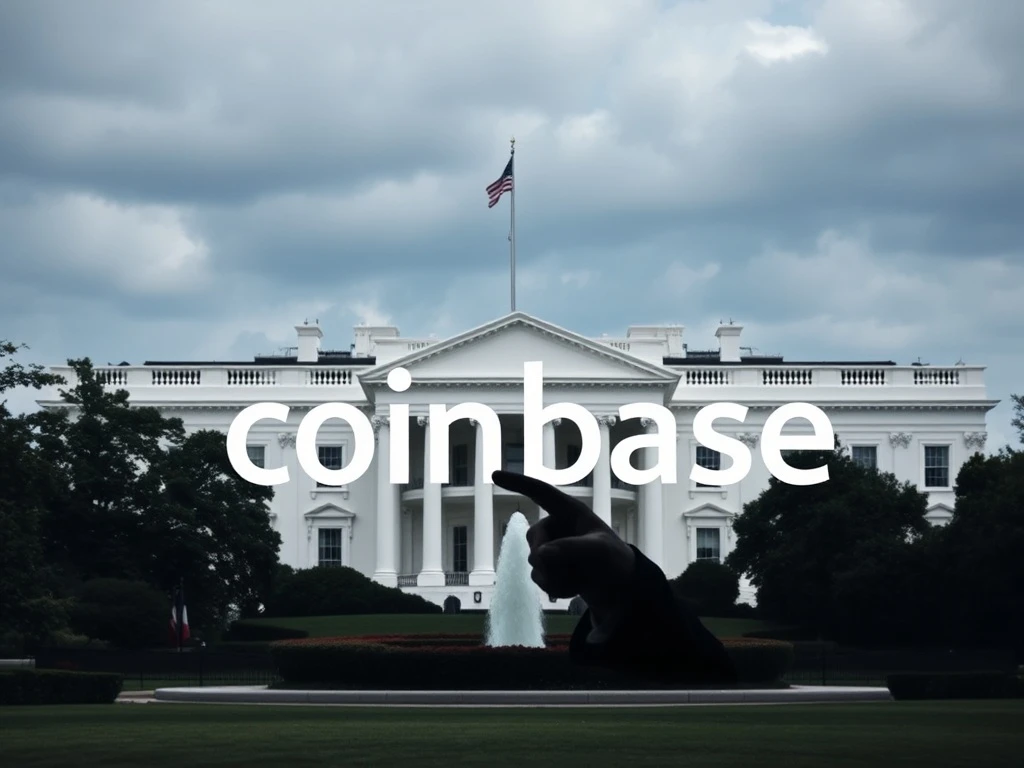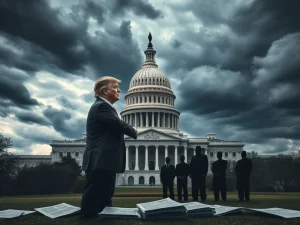Coinbase Navigates Controversial White House Ballroom Funding Amid Scrutiny

The prominent cryptocurrency exchange, Coinbase, recently found itself embroiled in a significant political controversy. It is defending its financial support for a new White House ballroom project, a situation that has drawn sharp criticism from a U.S. senator. This development highlights the increasing intersection of the crypto industry and traditional politics, particularly concerning political contributions and their perceived influence. The company’s chief policy officer has vigorously refuted allegations of corruption, asserting transparency and non-partisanship in its engagements. This incident sparks crucial discussions about the role of digital asset companies in Washington and the potential implications for future crypto regulation.
Unpacking Coinbase’s Political Contributions
Faryar Shirzad, Coinbase’s chief policy officer, recently pushed back against serious allegations from Connecticut Senator Chris Murphy. Senator Murphy publicly claimed that Coinbase functioned as a component in what he termed US President Donald Trump’s “corruption factory.” These accusations specifically centered on Coinbase’s financial support for the political action committee (PAC) Fairshake and its contributions to the 2025 inauguration. Furthermore, the senator drew a direct correlation between this funding and the US Securities and Exchange Commission (SEC) dropping an enforcement action against Coinbase. This action had been initiated during the previous presidential administration. Murphy’s claims, initially shared on social media, quickly gained traction, prompting a swift response from the crypto giant. The allegations underscore the growing scrutiny surrounding the crypto industry’s expanding footprint in Washington. Such political contributions are a common practice for many industries seeking to influence policy, but for a rapidly evolving sector like cryptocurrency, they often attract heightened attention.
The White House Ballroom Controversy Unveiled
At the heart of Senator Murphy’s allegations was a specific claim: Trump had demanded a “big donation from Coinbase for [his] ballroom.” Shirzad directly addressed this, stating that Coinbase was “proud to have supported the building of a new ballroom through the Trust for the National Mall.” He emphasized that numerous other companies also contributed to this fund, suggesting that Coinbase’s involvement was not unique or nefarious. However, the controversy deepened with revelations about the project itself. Trump initially announced plans for a 90,000 square-foot ballroom on the White House grounds in July, estimating its cost at approximately $200 million. He had explicitly stated the project would not “touch” the East Wing, a historic section housing the Office of the First Lady. Despite these assurances, recent photographs revealed the complete demolition of the East Wing as part of the ballroom construction. The estimated cost for the project also dramatically increased to $350 million, according to Trump. Shirzad quickly clarified Coinbase’s role, asserting, “Note that we’re not the general contractor, so we’re not the right target if you’re unhappy about how the project is proceeding.” This statement aimed to distance the exchange from the operational controversies of the White House ballroom construction.
Navigating Crypto Regulation Amidst Scrutiny
The allegations against Coinbase arrive at a pivotal moment for the cryptocurrency industry. The sector actively seeks clear and favorable crypto regulation in the United States. Shirzad’s defense highlighted Fairshake as a “non-partisan” PAC. He also noted that many public donations have supported previous inaugurations. However, critics often view such political donations as attempts to gain influence, regardless of their stated non-partisanship. The incident occurred just weeks after a Coinbase representative attended a fundraising dinner at the White House for the ballroom project. Other notable attendees included Gemini co-founders Cameron and Tyler Winklevoss, alongside a representative from Ripple Labs. This gathering underscores a broader trend: major crypto players are increasingly engaging directly with political figures and fundraising initiatives. While Coinbase declined to comment on the specific amount contributed to the Trust for the National Mall or the East Wing demolition, their presence at such events signals a strategic effort to build relationships in Washington. The industry understands that its future growth and stability depend significantly on the regulatory environment. Consequently, direct engagement and financial contributions have become key components of their advocacy strategy.
Coinbase’s Growing Influence with the Trump Administration
The White House ballroom incident is not an isolated event. It represents a pattern of Coinbase’s increasing financial involvement in projects supported by the Trump administration. In June, for example, the exchange prominently featured among the sponsors for a 250th-anniversary celebration of the US Army. This included a military parade occurring on Trump’s birthday. Coinbase’s participation involved a one-time contribution to America250, described as a “nonpartisan initiative” behind a series of events for the US’ semiquincentennial. These instances illustrate Coinbase’s strategic expansion of its presence in Washington. The company aims to ensure its voice is heard in policy debates. Furthermore, Coinbase CEO Brian Armstrong recently visited lawmakers during a government shutdown, which lasted 31 days. His purpose was to discuss critical crypto market structure legislation. Republican leadership had initially planned for the Responsible Financial Innovation Act, a significant crypto bill in the US Senate, to move out of committee by the end of October. However, the ongoing shutdown cast uncertainty over its priority in Congress. These efforts collectively demonstrate Coinbase’s commitment to shaping the legislative landscape for digital assets, solidifying its position as a key player in the political arena.
The Broader Landscape of Crypto’s Washington Push for Crypto Regulation
The controversy surrounding Coinbase’s political contributions and the White House ballroom project serves as a potent reminder of the cryptocurrency industry’s accelerating push into mainstream American politics. For years, the crypto sector largely operated on the fringes, but now, it actively seeks legitimacy and clear operational guidelines. This involves significant lobbying efforts, direct engagement with policymakers, and financial support for political campaigns and initiatives. Companies like Coinbase, Gemini, and Ripple Labs recognize that a stable and predictable regulatory environment is essential for their long-term growth and widespread adoption. The allegations of corruption, even if refuted, highlight the inherent risks and heightened scrutiny that come with increased political involvement. Transparency in such dealings becomes paramount to maintaining public trust and avoiding further controversy. Furthermore, the ongoing debates surrounding crypto regulation, including discussions around the Responsible Financial Innovation Act, demonstrate the urgent need for a comprehensive framework. The industry aims to move beyond a patchwork of state and federal rules. This framework would provide clarity for businesses and protection for consumers. The actions of the Trump administration and its interactions with crypto firms will undoubtedly shape the future trajectory of digital assets in the U.S. political landscape. The outcome of these engagements will influence not only the companies involved but also the broader perception and acceptance of cryptocurrencies in the nation.
The Future of Digital Assets in US Politics
As the cryptocurrency industry matures, its relationship with government and politics will continue to evolve. The Coinbase controversy, while challenging, also underscores the industry’s determination to engage with the political process rather than remain outside it. This proactive approach aims to shape legislation that fosters innovation while addressing legitimate concerns about market integrity and consumer protection. The debate over the White House ballroom funding and its perceived ties to regulatory decisions serves as a crucial test case. It illustrates the complexities involved when a burgeoning industry seeks to exert influence in Washington. Moving forward, clear communication and demonstrable ethical practices will be vital for crypto companies. They must navigate the intricate world of political contributions. The pursuit of clear crypto regulation will likely remain a top priority for firms like Coinbase. Their efforts to engage with various administrations, including the Trump administration, reflect a long-term strategy. This strategy seeks to integrate digital assets more deeply into the financial fabric of the United States. The journey will undoubtedly encounter more scrutiny and challenges, but the industry’s commitment to a political presence is now undeniable.







